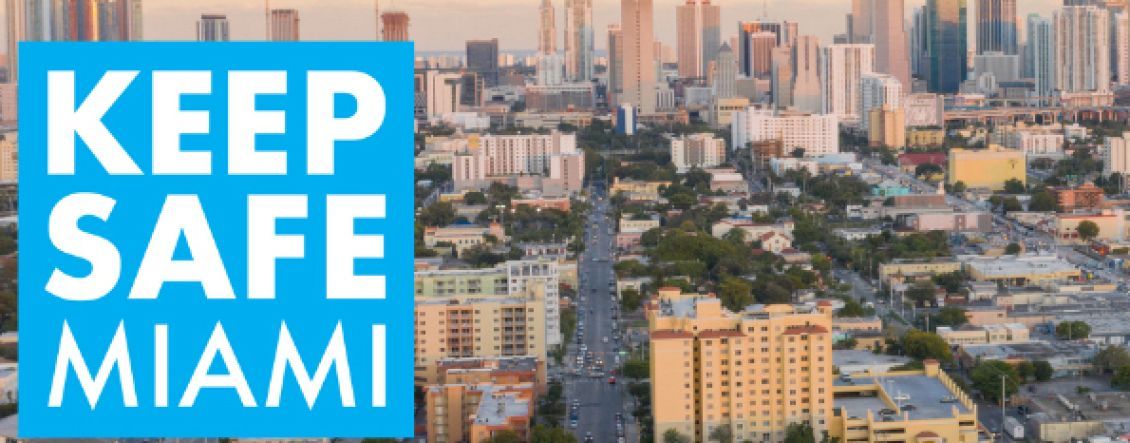MIAMI (Feb. 16, 2021) – Today, City of Miami Mayor Francis X. Suarez joined Enterprise Community Partners (Enterprise), funders, partner organizations, community members and resilience experts from around the region at a virtual event, Achieving Greater Resilience with Keep Safe Miami, to announce the launch of Keep Safe Miami, a new program to help affordable housing owners and operators protect their buildings and residents from climate change and natural disasters.
Owners and operators of multifamily affordable housing in Miami-Dade County can register for the program, which will offer access to free, easy-to-use tools and guides for assessing portfolio and property vulnerability to hurricanes and impacts of climate change, actionable strategies and guidance to address issues an opportunities to apply for capital for necessary improvements.
In addition, the City of Miami is providing $500,000 in deferred loans to be distributed among select Keep Safe Miami participants to assist with climate resilient property upgrades identified through the program.
“This project is the quintessential example of our efforts to build a Miami that lasts forever and a Miami that works for everyone,” said City of Miami Mayor Francis X Suarez. “Keep Safe Miami is protecting the apartments and the homes that make up the fabric of our community and its mission aligns perfectly with the Resilient 305 strategy: bolster our City’s resilience while maintaining its vibrancy.”
Suarez added, “In addition, the $500,000 Keep Safe Miami Loan Program will mitigate the devastating effects of climate change and, at the same time, help protect the residents of the City of Miami.”
South Florida is home to approximately 43,000 multifamily affordable housing units, many located in the Miami area. The impacts of climate change and extreme-weather conditions are increasing, and a number of these units are aging, without consideration of climate-related risks. In addition, the Miami-Fort Lauderdale-West Palm Beach metro area added approximately 181,000 new residents to the 100-year floodplain over the period ending in 2016, the most of any region nationally.
“We have seen firsthand what happens to communities that aren’t prepared when disaster strikes,” said Jacqueline Waggoner, president, Solutions Division, Enterprise Community Partners. “Keep Safe Miami brings together every available resource to make homes more resilient, particularly for low-income communities of color who face the most risk. Cities across the country will benefit from Miami’s example.”
Keep Safe Miami includes four components:
For Developers
- Portfolio Protect – analyzes the risks and identifies the most and least resilient properties in a portfolio.
- Building Protect – evaluates specific needs of properties and identifies resilience strategies at the building level through site assessments.
- Funding Resources Guide – provides information to affordable owners and portfolio managers about& resources available to help implement resilience strategies.
For Residents
- Training – free trainings on disaster preparedness as well as actions residents can take to increase their energy efficiency and save on costs.
In addition to remarks from Mayor Suarez, Enterprise’s President of Solutions Jacqueline Waggoner, representatives from JPMorgan Chase, the Southeast Sustainability Directors Network and representatives from Miami-Dade County and the city of Miami Beach, the virtual event also included a panel discussion on prioritizing resiliency and preservation among affordable housing properties, featuring Alan Dodd and George Mensah of the City of Miami, Laurie Schoeman of Enterprise, Steve Kirk of Rural Neighborhoods and Hattie Willis of Communities United.
“The keys to building resilient communities and keeping families safe are increased access to resources and collaborative programs,” said Maria Escorcia, Vice President of Global Philanthropy, JPMorgan Chase. “JPMorgan Chase is playing a key role in funding sustainable and affordable housing initiatives across South Florida. We’re proud to collaborate and support key initiatives like Keep Safe Miami which will help drive a more inclusive economy.”
“Miami-Dade County is one of the most vulnerable communities in the nation when it comes to climate impacts,” said Meg Jamison, Executive Director, Southeast Sustainability Directors Network. “The steps that Keep Safe Miami is taking to mitigate risk will not only help communities in the Miami area become more resilient and sustainable, but will also serve as a model to scale to other cities and counties throughout the region.”
Keep Safe Miami was developed by Enterprise in partnership with the City of Miami, Florida Housing Coalition, South Florida Community Development Coalition, Miami-Dade County, City of Miami Beach, Communities United, and IBTS, and made possible thanks to the generous support of JPMorgan Chase, Southeast Sustainability Directors Network, Regions Bank, and City National Bank.
Keep Safe Miami seeks to serve properties providing multi-family affordable housing at 80% AMI or below in Miami-Dade County. Owners and operators of properties meeting this criteria can visit Keep Safe Miami to register and begin the enrollment process. In addition, trainings will also be available for& potential participants& o learn more about the tools and resources available. Trainings for residents will be coordinated directly through Communities United.&
About the City of Miami
The City of Miami is the dynamic municipality at the heart of Miami-Dade County, home to Greater Miami’s financial and cultural heart, and economic engines such as PortMiami. Established in 1896, Miami has grown to become South Florida’s largest city by population and serves as the county seat. Today, the City of Miami proudly continues to provide core municipal services to its diverse population, from public safety to parks, as well as forward-looking initiatives like climate resilience. To learn more, visit www.miamigov.com.
Media Contact
Jordan Miller, Group Gordon
jmiller@groupgordon.com
